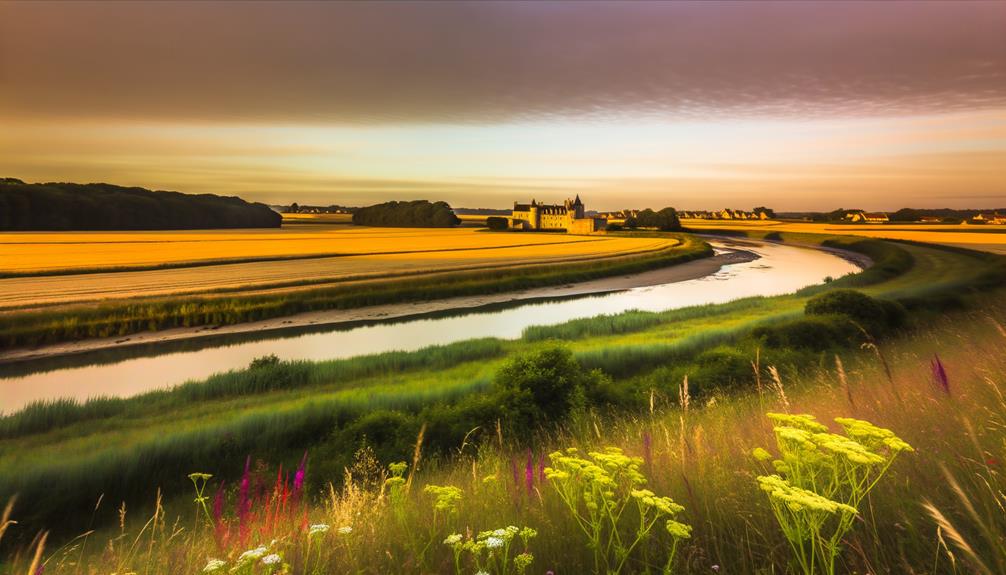Meaning of the Name Moore
The surname 'Moore' originates from the Old French 'more,' meaning 'dark-skinned,' and entered Middle English post-Norman Conquest (1066). It has Anglo-Saxon roots, linked to 'mor' for marshland, indicating regions with moors.
In Ireland, it serves as an Anglicization of the Gaelic 'Ó Mórdha,' meaning 'descendant of the great one,' with significant historical presence in County Laois. The name gained prominence in medieval England and spread globally due to British and Irish immigration.
Particularly, figures such as filmmaker Michael Moore and actor Roger Moore highlight its contemporary relevance. Explore further to uncover more intricacies of its lineage and impact.

Key Takeaways
- The surname 'Moore' originates from the Old French word 'more,' meaning 'dark-skinned' or 'swarthy.'
- In Ireland, 'Moore' is an Anglicized form of 'Ó Mórdha,' meaning 'descendant of the great one.'
- The name 'Moore' was used descriptively for individuals living near moorlands or marshy areas.
- It has Anglo-Saxon roots, derived from the Old English 'mor,' indicating a moor or marshland.
- The surname 'Moore' is common in English-speaking countries due to British and Irish immigration.
Origin and Etymology
The surname 'Moore' has its origins rooted in the Old French word 'more,' meaning 'dark-skinned' or 'swarthy,' which was adopted into Middle English following the Norman Conquest of 1066. This etymological shift reflects the broader cultural and linguistic influences of the Normans on England.
The term 'more' was often used to describe individuals of darker complexion, likely deriving from the Latin word 'Maurus.' Historical records from the 12th and 13th centuries indicate the widespread use of 'Moore' as a surname, particularly in regions with Norman settlements.
This surname also served as a topographical identifier for individuals living near moorlands, emphasizing the dual nature of its etymology—both descriptive and locational.
Gaelic Roots
In addition to its Norman and Old French influences, the surname 'Moore' also boasts significant Gaelic roots, particularly evident in regions of Ireland where it is an Anglicized form of the Irish 'Ó Mórdha,' meaning 'descendant of Mórdha,' with 'Mórdha' translating to 'great' or 'noble.'
Historical records indicate that the Ó Mórdha clan was prominent in County Laois, where they held considerable influence and land. The shift from 'Ó Mórdha' to 'Moore' occurred during the Anglicization processes of the 16th and 17th centuries, when English policies aimed to standardize and simplify Gaelic names.
This Gaelic lineage highlights the deep historical and cultural connections embedded within the surname 'Moore,' reflecting its diverse and multifaceted heritage.
Anglo-Saxon Influence
Anglo-Saxon influence on the surname 'Moore' emerges through historical documentation that traces its etymology to Old English elements such as 'mor,' denoting a moor or marshland. This term was used descriptively to identify families residing near such geographic features.
Historical records from the Anglo-Saxon period, including land charters and legal documents, frequently mention individuals with the name 'Mor' or 'Mora,' indicating a strong nexus between the surname and topographical characteristics. The term persisted through centuries, becoming a common surname as populations grew and settled in varied landscapes.
Hence, the Anglo-Saxon influence is evident in the enduring link between the name 'Moore' and the natural environment, reflecting the importance of geography in surname formation during that era.
Historical Significance
As the surname 'Moore' evolved beyond its Anglo-Saxon roots, its historical significance became intertwined with various sociopolitical and cultural developments across different regions.
In medieval England, the name was often associated with individuals who lived near moorlands, indicating a connection to the land and its resources.
During the Norman Conquest, the name gained prominence as Norman lords adopted it, reflecting their new dominions.
The surname also appears in Irish history, where it was anglicized from 'Ó Mórdha', meaning 'descendant of the great one'.
In the American context, Moores were early settlers, contributing to colonial expansion and governance.
This rich historical tapestry underscores the name's enduring legacy and its multifaceted role in shaping societal narratives.
Geographic Distribution
The surname Moore is found across various regions globally, with significant concentrations in the United States, Ireland, England, and Australia, reflecting diverse migration patterns and historical settlements.
In the United States, Moore ranks among the most common surnames, largely due to British and Irish immigration during the 17th and 18th centuries.
In Ireland, the name is prevalent both as an Anglicization of the Gaelic 'Ó Mórdha' and from English settlers.
England sees a high incidence of the surname, particularly in regions like Lancashire and Yorkshire, where it is derived from geographical features such as moorlands.
Australia's Moore population surged during the 19th century gold rushes, drawing English and Irish migrants.
This geographic spread underlines the name's historical mobility and adaptation.
Famous Bearers
Among the many bearers of the Moore surname, several individuals have achieved historical prominence in fields such as literature, politics, and entertainment, reflecting the name's widespread influence and legacy. In literature, Thomas Moore stands out as a celebrated Irish poet and songwriter. In politics, Clement Clarke Moore, known for his legislative contributions, made significant strides in American history. Entertainment has seen the rise of Roger Moore, an iconic actor famous for his portrayal of James Bond. Moreover, in the domain of sports, Bobby Moore is remembered as an exceptional English footballer.
| Name | Field |
|---|---|
| Thomas Moore | Literature |
| Clement Clarke Moore | Politics |
| Roger Moore | Entertainment |
| Bobby Moore | Sports |
These individuals exemplify the diverse achievements of those bearing the Moore surname.
Cultural Impact
Moore's surname has left a profound imprint on various cultural spheres, shaping literary traditions, political landscapes, and entertainment history. Historically, the name has been associated with significant contributions:
Literary Influence: Thomas Moore, an Irish poet, played a crucial role in 19th-century Romantic literature, known for his works like 'Lalla Rookh'.
Political Impact: Clement Clarke Moore, credited with writing 'A Visit from St. Nicholas,' also influenced early American political thought as a professor.
Entertainment Legacy: Mary Tyler Moore, an iconic actress, revolutionized television with 'The Mary Tyler Moore Show,' impacting societal views on women in the workplace.
These figures exemplify the cultural resonance of the Moore surname, highlighting its enduring legacy across centuries.
Variations and Derivatives
The name Moore has evolved through various iterations and adaptations across different cultures and time periods. Historically, derivative forms such as 'Moor' and 'Muir' have surfaced, each carrying distinct regional connotations.
This section will examine the common variations, trace their historical origins, and explore the regional differences that have influenced the name's evolution.
Common Variations Explained
Frequently, the surname Moore has evolved into several variations and derivatives throughout history, reflecting regional linguistic influences and migrations. These transformations are often influenced by phonetic spellings, local dialects, and the adaptation of the name in different cultural contexts.
Notable variations include:
- Muir: Common in Scotland, deriving from the Scots Gaelic word for 'moor' or 'sea.'
- Moor: A simplified version found in England, often associated with someone who lived near a moor or heath.
- More: Seen in Irish contexts, this variation can be linked to the Gaelic word 'mór,' meaning 'great' or 'big.'
These variations exemplify the dynamic nature of surnames and their adaptation to different linguistic and cultural environments.
Historical Derivatives Overview
Tracing the historical derivatives of the surname Moore reveals a rich tapestry of linguistic evolution and cultural adaptation, highlighting how this name has transformed across different regions and time periods.
Originating from the Old English 'Mór,' meaning 'marsh' or 'open land,' the name evolved into various forms depending on geographic and social factors.
In Ireland, Moore is derived from 'Ó Mórdha,' meaning 'descendant of the great one.' The Norman influence brought variations such as 'de la Mare' in medieval England.
Historical records also show adaptations like 'Muir' and 'More,' reflecting the phonetic and orthographic changes over centuries. These derivatives underscore the name's resilience and its embeddedness in cultural histories across the British Isles.
Regional Name Differences
Regional variations of the surname Moore present a fascinating study in how linguistic, cultural, and historical influences shape nomenclature across different locales.
In England, 'Moore' often derives from the Old English word 'mor,' meaning 'marsh' or 'fen.'
In Ireland, the name is an Anglicized form of the Gaelic 'Ó Mórdha,' which translates to 'descendant of the majestic.'
Meanwhile, in Scotland, 'Muir' is a common variant, derived from the Scots word for 'moorland.'
These variations illustrate the rich tapestry of historical and regional influences on the surname.
Modern Usage
In contemporary times, the surname Moore is widely recognized across diverse cultures and professions, maintaining its significance and adaptability within modern society. Historically rooted in English and Irish origins, Moore has evolved to be prominent in various fields, including politics, entertainment, and academia.
Notable figures such as Michael Moore, an influential filmmaker, and Roger Moore, the celebrated actor, exemplify its widespread appeal. The name's versatility is evident in its seamless integration into different linguistic and cultural contexts.
Additionally, statistical analyses reveal that Moore remains among the most common surnames in English-speaking countries, signifying its enduring resonance. This persistent relevance underscores Moore's capacity to transcend historical boundaries, continually adapting to contemporary societal dynamics.
Conclusion
Meticulously tracing the moniker 'Moore' reveals rich roots, ranging from Gaelic genesis to Anglo-Saxon ancestry.
Historical significance is highlighted through heraldic records and geographic dispersion, showcasing the name's widespread adoption.
Esteemed individuals bearing the name have further cemented its cultural influence.
Variations and derivatives demonstrate the dynamic nature of linguistic evolution.
Modern usage underscores its enduring appeal.
Through this alliterative analysis, the name 'Moore' manifests as a multifaceted marker of identity, history, and heritage.






